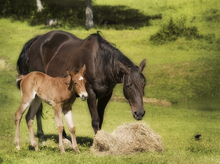According to Dr. John Byrd, owner of Horsemen’s Laboratory, adult roundworms (Paracrid Equorum) are large, 4-12 inches in length, white to grayish in color, and look similar to earthworms. They are very prolific with females producing up to 200,000 eggs per day.

Pasture as a source of roundworms in young horses
It is very important to do stool sample examinations on young horses to see how well roundworms are being controlled, because resistance in roundworms to Ivermectin has been demonstrated.
Roundworm eggs are the second most common worm eggs found at Horsemen’s Laboratory. The two main reasons for this are:
- Roundworms are generally found in young horses under 2 years of age (as horses age they seem to develop immunity to the larva that stop their development to adults).
- Over 95% of the samples Horsemen’s Laboratory receives come from horses over 2 years of age.
The information presented in this article comes from personal experience, extensive review of published material, and private communication with expert equine parasitologists with extensive research experience, and by attending seminars.
My Personal experience comes from first owning a small quarter horse breeding farm in Illinois when I graduated from the School of Veterinary Medicine at the University of Illinois in 1970. Then in 1980 I moved to California where I was in general equine practice and took care of a medium sized thoroughbred farm for 12 years.
Adult roundworms are large, 4-12 inches in length, white to grayish in color, and look similar to earthworms. They are very prolific with females producing up to 200,000 eggs per day. Foals and yearlings can have so many adult roundworms that they may cause colic and even rupture the small intestine where they reside especially when they are killed by dewormer.
This rarely occurs and when it does the history generally is that the foal has not been dewormed early enough and is in an environment where large numbers of foals have been raised without proper care.
The eggs produced are passed with the stool on the pasture and in the stall. There the embryo develops within the egg and remain viable for up to ten years. The eggs have a rough, thick outer shell that protects the embryo and the eggs sticks to dust particle, hay, and grass and thereby are readily available to be eaten by the horse.
Once the embryonated egg is eaten it hatches and the larvae are free to burrow through the intestinal wall and migrate to liver through the lymphatic channels and blood stream. From the liver they enter the blood stream again and end up in the lungs.
In the lungs the larvae get into the alveoli (air sacks) then into the bronchioles and are coughed up swallowed and develop into adults in the small intestine and start laying eggs. During the migration the larvae cause scar tissue in the liver and lungs.
This scar tissue does not appear to remain in those organs as the horse matures. The effect this scarring has on the performance of the horse as it gets older is unknown.
However as the larvae are migrating through the lungs they do cause severe signs of inflammation with nasal discharge, coughing, retarded growth, poor hair coat and pot belly appearance.
The horse’s immune system is given credit for limiting the infections to younger horses. Therefore, it is thought that young horses should be allowed to have some exposure to round worm infections to stimulate the immune system to develop this protection. However, it is not clear how or where this actually works or takes place.
As previously stated roundworms are generally considered a worm that only effect young horses. However Horsemen’s Laboratory has found roundworm eggs occasionally in horses over 2 years of age.
It is very important to do stool sample examinations on young horses to see how well roundworms are being controlled, because resistance in roundworms to Ivermectin has been demonstrated. Therefore one may deworm young horses and feel confident they have protected their horses, but if the roundworm are resistant to the medication used they will continue to reproduce and cause injury to the horse.
If you have questions specific to your barn, pastures, or testing program contact Dr. John Byrd: E-mail: hlab@horsemenslab.com Phone: (800) 544-0599 Contact form: www.horsemenslab.com
To order testing kits visit: www.horsemenslab.com or call: (800) 544-0599.
Horsemen’s Laboratory owner, Dr. John Byrd, has extensive experience with racing and breeding horses and maintains Westbrook Boarding Stable. He founded Horsemen's Laboratory in 1992 so that horse owners could better evaluate their worm control programs and make informed decisions about deworming their horses.
